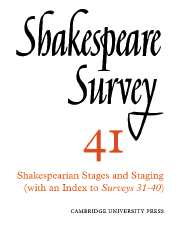Book contents
- Frontmatter
- The Shakespearian Stages, Forty Years On
- The Original Staging of The First Part of the Contention (1594)
- Charles Calvert’s Henry V
- Hamlet, An Apology for Actors, and The Sign of the Globe
- ‘Hid indeed within the centre’: The Hall/Finney Hamlet
- Malvolio and the Dark House
- The Text of Cressida and Every Ticklish Reader: Troilus and Cressida, The Greek Camp Scene
- Antony and Cleopatra, Act 4 Scene 16: ‘A Heavy Sight’
- The Tempest’s Tempest at Blackfriars
- Keats and Lucrece
- The Resources of Characterization in Othello
- Ovid and the Mature Tragedies: Metamorphosis in Othello and King Lear
- The Passing of King Lear
- Shakespeare Performances in London and Stratford-upon-Avon, 1986–7
- Professional Shakespeare Productions in the British Isles, January–December 1986
- The Year's Contributions to Shakespeare Studies: 1 Critical Studies
- 2 Shakespeare’s Life, Times, and Stage
- 3 Editions and Textual Studies
- Books Received
- Index to Volume 41
- General Index to Volumes 31-40
2 - Shakespeare’s Life, Times, and Stage
Published online by Cambridge University Press: 28 March 2007
- Frontmatter
- The Shakespearian Stages, Forty Years On
- The Original Staging of The First Part of the Contention (1594)
- Charles Calvert’s Henry V
- Hamlet, An Apology for Actors, and The Sign of the Globe
- ‘Hid indeed within the centre’: The Hall/Finney Hamlet
- Malvolio and the Dark House
- The Text of Cressida and Every Ticklish Reader: Troilus and Cressida, The Greek Camp Scene
- Antony and Cleopatra, Act 4 Scene 16: ‘A Heavy Sight’
- The Tempest’s Tempest at Blackfriars
- Keats and Lucrece
- The Resources of Characterization in Othello
- Ovid and the Mature Tragedies: Metamorphosis in Othello and King Lear
- The Passing of King Lear
- Shakespeare Performances in London and Stratford-upon-Avon, 1986–7
- Professional Shakespeare Productions in the British Isles, January–December 1986
- The Year's Contributions to Shakespeare Studies: 1 Critical Studies
- 2 Shakespeare’s Life, Times, and Stage
- 3 Editions and Textual Studies
- Books Received
- Index to Volume 41
- General Index to Volumes 31-40
Summary
Yoshiko Kawachi’s Calendar of English Renaissance Drama, 1558–1642 is likely to find its way on to the reference shelves of most libraries. It attempts to present, in tabular form and chronological order, as much essential information as possible about every known play, masque, or entertainment of consequence in the period, extant or lost, acted or not. (The only significant omissions would appear to be the less noteworthy provincial religious dramas and civic entertainments, which are being dutifully catalogued in the Records of Early English Drama series.) Each entry lists, in so far as the information can be determined, whether the work was performed or not, the date of first performance (subsequent recorded performances receive separate entries) or other early evidence of existence (such as date of licensing, entry in the Stationers’ Register, or publication), the place of performance and principal persons before whom it was performed, the actors, the title, the type of the work (tragedy, pastoral, masque etc.), the author(s), date of the earliest editions and existence of any manuscripts, and a brief indication of the source of the information. This is all cross-referenced by works, authors, and acting companies. There are, inevitably, limitations. Where, as in many cases, matters of dating or authorship are disputed, the Calendar does no more than suggest limits or note queries, relying for the most part on standard authorities like the Annals of English Drama, Chambers, and Bentley; it does not refer us to the most recent discussions of such matters.
- Type
- Chapter
- Information
- Shakespeare Survey , pp. 214 - 228Publisher: Cambridge University PressPrint publication year: 1989

